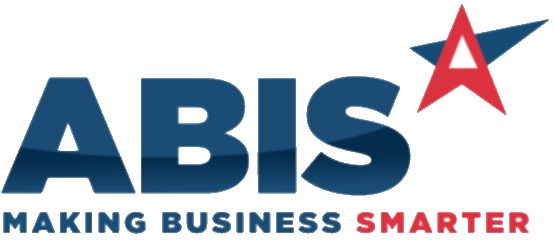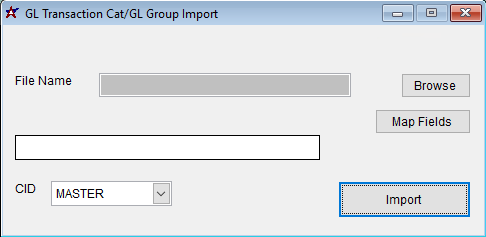Difference between revisions of "Transaction Cat / GL Group Import Guide"
From Adjutant Wiki
| Line 51: | Line 51: | ||
Required fields are indicated with * | Required fields are indicated with * | ||
| − | '''CustCat''' - | + | '''CustCat''' - Customer Transaction Code from the CUSTCAT rul |
'''ItemCat''' - | '''ItemCat''' - | ||
Revision as of 10:48, 29 May 2019
Contents
- 1 General Data Import Notes
- 2 Trans Cat / GL Group Import Notes
- 3 Trans Cat / GL Group Import File Data Scrubbing
- 4 Trans Cat / GL Group Import Screen (IMPORTGLGRP)
- 5 Trans Cat / GL Group Import File Definitions
- 6 Chart of Accounts Import Reconciliation
- 7 Chart of Account Import Additional Steps
- 8 Chart of Accounts Import Database Tables
General Data Import Notes
Refer to the Data Import General Information page for information and guidance on general import timeline, formatting import templates, as well as how to ensure you are using the most current template information for data imports.
Trans Cat / GL Group Import Notes
The Trans Cat / GL Group Import does not have an Export Template option. You can find a copy of the Transcat Import Template in the ABIS FTP site in \Implementation Files\Import Templates.
The Trans Cat / GL Group Import does not use the f1-f999 row and has the data field names in row 1. The import routine starts importing records on row 2 of the XLS file.
Timing and Preparation
The Trans Cat / GL Group Import can be used any time after the GL Chart of Accounts has been established. Transaction Categories and GL Groups can be associated with various records in Adjutant, such as customers, warehouses, and certain rules.
General Notes
The Trans Cat / GL Group Import can be used to add new Transaction Categories and/or GL Groups. It can also be used to update the GL Accounts associated with existing Transaction Categories and/or GL Groups if an exact match is found.
Trans Cat / GL Group Import File Data Scrubbing
Confirm that all GL accounts are formatted with the proper GL mask.
GL Account wildcard entries should use the underscore character as placeholders. For example, to import just the middle segment of a 3 segment GL account in the format of ####-###-####, enter '____-100-____'. In this example, use 4 underscore characters for the first and last segments to represent the four character spaces in the GL mask.
Trans Cat / GL Group Import Screen (IMPORTGLGRP)
Menu Location: Transaction>>Importers/Exporters>>Accounting>>Trans Cat/GL Group Import
File Name/Browse: Use the Browse button to locate and select the completed Trans Cat / GL Group import template file (in XLS format)
Map Fields: Fields must be mapped prior to importing. If no changes have been made to the column headings, the mapping screen should show all green, and you can click OK to continue. If any of the Input Field Name columns on the left are red, single-click on the line on the left column, and then double-click the desired mapped field in the right column to complete the mapping. Repeat for any red lines on the left that should be mapped. If there are additional columns in the source file that should NOT be mapped, they can be left unmapped (displayed in red). Mandatory fields will require that they be mapped before clicking OK.
Trans Cat / GL Group Import File Definitions
Required fields are indicated with *
CustCat - Customer Transaction Code from the CUSTCAT rul
ItemCat -
GLGroup -
Descrip -
DL1 -
DM1 -
DS1 -
DE1 -
DL2 -
DM2 -
DS2 -
DE2 -
FD1 -
FD2 -
Chart of Accounts Import Reconciliation
Reconciling imported data should begin with spot-checking several records field-by-field for complete data import. Pick records from the source file that have the most data columns filled in. Verify that all source file data fields imported correctly and display as expected.
Perform a SQL query on the GLACCT table and confirm that the number of records matches the expected number of imported accounts.
Verify that the GL Account Maintenance Balances tab shows all of the current and next year fiscal periods in the grid.
Run the Chart of Accounts Report and verify that imported accounts show up correctly.
Chart of Account Import Additional Steps
Set up and review the GL Types and Ranges screen settings to make sure the ranges include every imported GL account. Use the Update GL button after completing the import to update the GL Account Type on all imported accounts.
Chart of Accounts Import Database Tables
Importing GL account records can affect the following databases:
GLACCT - Each imported GL account is assigned a unique KEYNO value tied to the GLACCT value, which should also be unique.
GLBALS - Each imported GL account also creates 24 entries in the GLBALS table - one for each fiscal period in the current year, and the following year. Each fiscal period month is assigned a unique KEYNO and links to the GLACCT table using the GLACNT field value.

